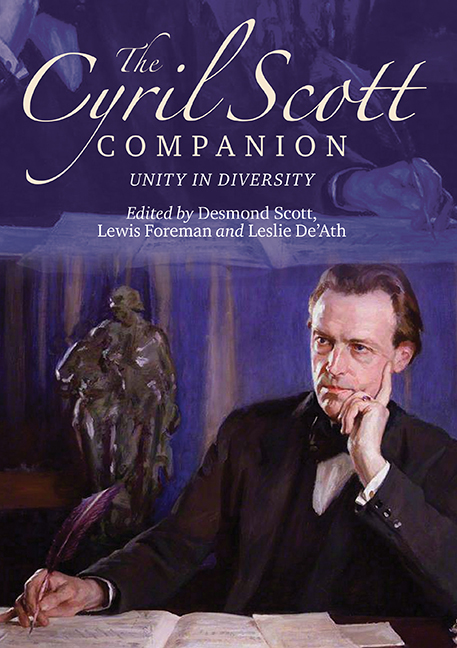Book contents
- Frontmatter
- Dedication
- Contents
- List of Illustrations
- List of Tables
- List of Contributors
- Foreword
- Preface
- Acknowledgements
- Editors' Note
- I SCOTT IN CONTEXT
- II THE MUSIC
- III THE WRITINGS
- 17 The Poetry
- 18 The Occult Writings
- 19 The Purpose of The Boy Who Saw True
- 20 Near the End of Life: Candid Confessions and Reflections: A Discussion of the Memoir
- 21 The Therapeutic Books
- 22 Childishness or The Moron Mind
- 23 A Note on the Plays
- IV PERSONAL REMINISCENCES
- APPENDICES
- CATALOGUES, DISCOGRAPHY AND BIBLIOGRAPHY
- Index of Works
- General Index
20 - Near the End of Life: Candid Confessions and Reflections: A Discussion of the Memoir
from III - THE WRITINGS
Published online by Cambridge University Press: 14 September 2019
- Frontmatter
- Dedication
- Contents
- List of Illustrations
- List of Tables
- List of Contributors
- Foreword
- Preface
- Acknowledgements
- Editors' Note
- I SCOTT IN CONTEXT
- II THE MUSIC
- III THE WRITINGS
- 17 The Poetry
- 18 The Occult Writings
- 19 The Purpose of The Boy Who Saw True
- 20 Near the End of Life: Candid Confessions and Reflections: A Discussion of the Memoir
- 21 The Therapeutic Books
- 22 Childishness or The Moron Mind
- 23 A Note on the Plays
- IV PERSONAL REMINISCENCES
- APPENDICES
- CATALOGUES, DISCOGRAPHY AND BIBLIOGRAPHY
- Index of Works
- General Index
Summary
CYRIL Scott wrote this memoir between 1942 and 1944. It exists, like The Poems of a Musician, only in typescript. That he was unable to find a publisher for it is not entirely surprising, for while the material itself is of great interest, it is also excessively long-winded and self-conscious. Though some of the content was used in the later 1969 autobiography, Bone of Contention, much of it is new and does not feature in any of his other writings, making it, despite the style, an essential document for any serious student of Scott's work.
The war years, 1939–1945, were a very bleak period for Scott. He was almost sixty- five, depressed and unwell, firmly convinced he would not live to see seventy. He had been largely passed over as a serious composer, remembered for short piano pieces but not for any of his major compositions.
When the war began he and his wife, Rose, separated, leaving their London home to avoid the bombing. He went for a short time to his sister Mabel's in Somerset, while Rose went to stay with Melanie Mills in Sussex. After leaving his sister's home Scott spent the rest of the war in a series of guest houses, rootless and restless. He had little money, no piano on which to compose, and lacked the guidance and support of his spiritual master, which had always been so important for him. Nevertheless, he managed to continue working as hard as ever. He completed not only the volume of poetry referred to above, but also a sixty-three page document, The Rhymed Reflections of a Ruthless Rhymer, written entirely in rhyme on one of his favourite topics: adult childishness. He also wrote four full-length plays and two adaptations of well-known novels.
Near The End of Life is not, as he said in his Introduction, an autobiography in the sense of being a history of life events; it is concerned more with his mental and creative attitude during a difficult period. It is not a diary hastily scribbled in moments of anger or depression, but a carefully composed document intended for publication. He wished, he said, to ‘express myself relative to matters concerning my creative efforts and my many transgressions, before I arrive at that state of disembodiedness which will render such an undertaking no longer possible.’
- Type
- Chapter
- Information
- The Cyril Scott CompanionUnity in Diversity, pp. 347 - 358Publisher: Boydell & BrewerPrint publication year: 2018



